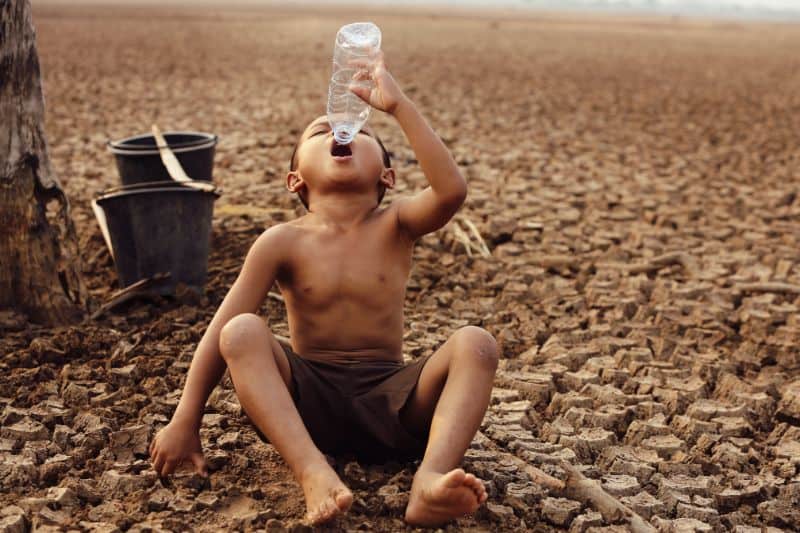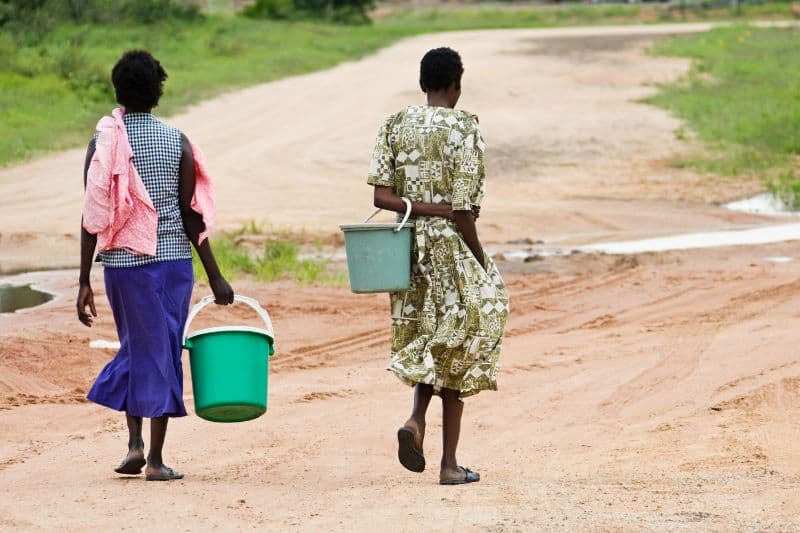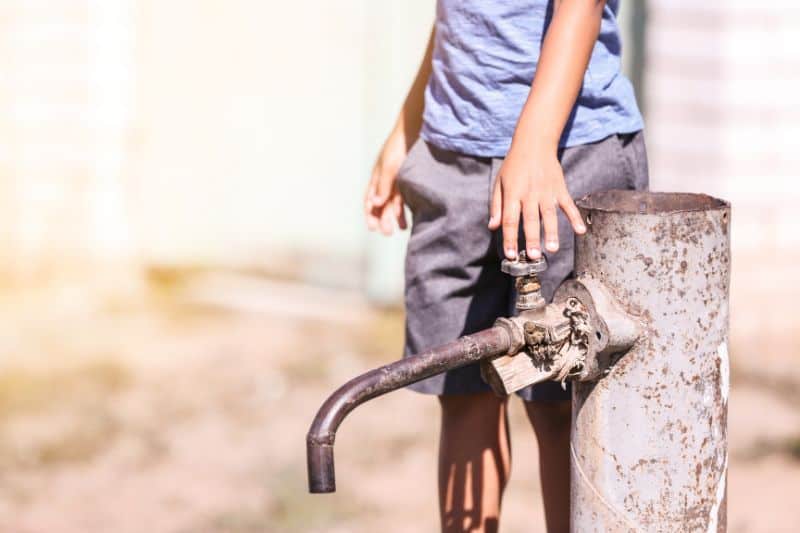To emphasize the severity of water shortages both locally and on a global scale, it is necessary to inform the public of this startling statistic. Every continent around the world is affected, not just those regions that are traditionally dry.
At least two billion people are affected for at least one month of the year, and more than 1 billion people have no access to clean drinking or potable water.
Here is an extension of what water shortages entail and what it means to be without it.
- There is a lack of necessary resources to meet current needs
- Water shortages are also known as – water scarcity, water stress, water crisis
- Apart from the lack of resources, there is difficulty in obtaining access to freshwater
- Due to the lack of resources and access to water, further deterioration of existing resources occurs
- Due to dry weather conditions, further depletion occurs
- Pertinently, water shortages refer to regions’ existing unpolluted water being far less than its demand
- A distinction needs to be made between what is in demand and what is reasonably needed
Clean water has become like a luxury for people in places like sub-Saharan Africa. Most people spend the entire day searching for it, which limits their ability to try to their hand in some other things.
By 2025, projections show that the situation may worsen, with more than two-thirds of the world’s population predicted to be within odds of facing water shortages.
Wikipedia defines water shortage as,
“Water scarcity is the lack of sufficient available water resources to meet water needs within a region. It affects every continent and around 2.8 billion people around the world at least one month out of every year. More than 1.2 billion people lack access to clean drinking water. Water scarcity involves water stress, water shortage or deficits, and water crisis.“
Perhaps you’re wondering, “Why all this problem when almost three quarters if the earth is covered by water?”
Well, it’s simple.
While about 70% of the Earth is covered with water, as we already know, only 2.5-3% of this water is fresh. The rest of the water is salty and ocean-based.
Of that 3% freshwater, two-thirds is trapped in glaciers and snowfields and unavailable for our use. The remaining one-third of that freshwater is available for human consumption and to feed the entire population on this planet.
As a result, freshwater – which is the water that we drink, take a bath with, and perform the majority of other home chores – is rare and makes up a very small fraction of all water on the planet – maybe 1% of Earth’s water or even less!
Hence, the global problem of water shortages needs to be highlighted and re-emphasized over and over again until such time that everyone is fully aware of this and does their part to responsibly save water, even in areas where it is perceived that there are already sufficient supplies of water.
To further the cause of this awareness, this short but extensive article provides readers with an informative but easy-to-understand explanation of what water shortage entails.
It begins by describing what is meant by water shortage. It then moves on to highlight the critical causes of this. Following that, to highlight the need to move towards conserving water, it features some of the effects and severe consequences of water shortages. Ending the article on a positive note, solutions to addressing these shortfalls are highlighted. The structure of this note is more informational than anything else.
Motivations for curbing excessive water use occur on a daily basis. Helping to raise awareness also means educating the public by dispensing important information.

Some of the Main Causes of Water Shortage
Environmentalists and small-scale activists these days have field days naming global warming and climate change as the root cause of the world’s water shortages. But this analogy is not entirely correct.
What also needs to be examined is what is causing global warming and the current climate crisis today. This next list highlights the main causes of water shortages around the globe.
- Excess and unnecessary demands outstrip available and scarce resources.
- Increased pollution due to excessive and unsustainable human consumption. The past 100 years have seen incredible growth in the human population due to medical advances that have prolonged life and improved mortality rates and agricultural improvements that have increased the food supply. In 1800, there were only one billion people on earth, and it is nearly 8 billion in 2020.
- There is an overuse of water across the board and in all forms of industrial processes. Overuse in agriculture is a major source of freshwater shortage as it reduces the amount of water available for other purposes. Agricultural overuse also adds to pollution, as the runoff from fields and farms carries pollutants like fertilizers and pesticides into nearby rivers, lakes, and streams.
- Non-sustainable domestic practices include leaving taps running when water is not needed. The use of inefficient showerheads, dishwashers, and pressure washers to replace sweeping or scrubbing need to be stopped.
- Unlimited household cleaning and sanitation is simply a waste of freshwater. While we all need water to bathe ourselves and keep our bodies clean, we also use water to wash clothes, dishes, floors, and household surfaces and utensils. In communities with flushing toilets, we use liters of water every time we use the bathroom.
- Increased urbanization is another reason. In 1950, 30% of the world’s population lived in cities. By 2050, it’s expected to be nearly 70%. Cities themselves consume water, and as they grow, they consume more.
- Economic scarcity caused by poor or lack of management of existing water resources.
- Uneven distribution of water resources – regions with excess supplies do not divert resources to areas where they are needed more.
- Aquifers over-pumped and not re-charging quickly enough.
- Pollution remains one of the biggest drivers of water scarcity. Sadly, most governments around the globe don’t do nearly enough to penalize industrial use companies that illegally dump chemicals and oils into stressed water systems.
- Land restrictions. Lack of access to land presents challenges of conflict where many people are restricted or denied access to land, whether privately or government-owned, and on which precious water resources may be found.
- The challenge of distance remains acute in some parts of the world where regions have historically experienced dry climates and have had to rely on neighboring countries to supply them.
- Global climate change due to deforestation is impacting freshwater supplies everywhere. Higher temperatures mean reduced snowfalls and shrinking glaciers, as well as increasing the percentage of freshwater evaporation. The quantity of water in our rivers, aquifers, and watersheds is simply reducing.
- The increased competition for freshwater often unintentionally causes water shortage. Cities like Las Vegas and Dubai were founded in areas with natural water scarcity. The Colorado River once ran to the Gulf of California, supplying fresh water for downriver needs in Arizona and California, but now it seldom reaches the gulf at all. As Las Vegas consumes more water ever, the downriver communities, wildlife habitats, and industries are impacted, and this kind of competition is playing out in hundreds of climates, countries, and communities all over the world.
- War and conflict are often overlooked factors that affect access to water supplies. In times of war, the boundaries of countries become muddled and often key water supplies like rivers become natural front lines in the conflict. This makes access to some of these rivers incredibly difficult. Thousands and sometimes millions of people may have to leave their homes and become refugees in another region, generating a water shortage for this sudden new population.
Effects and Severe Consequences of Water Shortages
To emphasize the severity of water shortages, it is incumbent to highlight some of the many effects and consequences of this. This list is as broad-based as it can be right now, from chronicling how it impacts domestic life to the global picture referred to as a tipping point when seen in relation to rising temperatures.
- The biggest problem that happens when you have a water shortage is the lack of access to drinking water. People are not able to get fresh, clean drinking water. The human body can hardly survive so long without water, and a lack of drinking water can result in a number of other problems.
- If there is no water to water the crop, people will soon face the hunger problem. Animals will also die, which will result in a lack of meat as well. Water shortage, in short, causes starvation to occur en masse for both people and animals that are located in the area.
- Poorer communities and informal settlements still lack access to potable water systems.
- Water restrictions imposed across the board.
- Negative impact on greening and domestic gardening initiatives due to water restrictions.
- Increased fire hazards.
- Polluted river beds and lakes harm ecosystems, including flora and fauna.
- Water tariffs and/or prices increased across the board.
- Particularly in drought-stricken areas, farmers are unable to produce vital crops.
- Due to extensive over-pollution, ice glaciers melt and contribute towards rising sea levels and/or temperatures.
- A global increase in temperatures further exacerbates water shortages.
- Mainly due to both lack of access and poverty, the disease is the sum consequence. Clean water is needed to revive and sustain the human body, while polluted river beds near informal settlements are the breeding ground for malevolent diseases.
- Added to this severe lack of water resources comes the problem of basic sanitation needs being exacerbated. Since we need water for several tasks of our daily life, without having access to clean water for drinking, cooking, washing or bathing, it usually results in unhygienic conditions for people and diseases become much more of an issue than it would have been otherwise. It also causes mental health issues, including depression and anxiety.
- A lack of education and access to all other areas of life has also been added as severe consequences to not having access to water.
- Water shortage also leads to problems such as migration waves, destruction of habitat and loss of biodiversity. Animals, plants and even humans that no longer be able to get enough water may therefore have to move to other regions or die or become extinct.

Solutions to the Problem of Water Shortage
The good news is that there are always solutions to our problems. And of course, the most effective remedy to our water shortage is efficient use of what’s already there. The less water that is used and the more water that is saved will go a long way towards addressing the current shortages.
But for solutions to be effective, they need to be implemented vigilantly and even through regulation. This next list considers both practical solutions and those being implemented in different parts of the world.
- Do not keep taps running while water is not needed. For instance, switch the tap off while brushing teeth.
- Only use what is needed resourcefull. For example, when washing dishes, make sure that the sink is full.
- Obey water restrictions enforced. For example, do not use the hosepipe while washing the car.
- Increased water tariffs where appropriate. This can make consumers more budget conscious and deter them from using water excessively.
- Sustainable home living needs to be practiced. For instance, take short showers instead of long baths.
- Recycle used water as much as possible.
- More stringent regulation of industrial processes is required.
- Organic consumption across the board needs to be encouraged and prioritized. Organic production and consumption processes invariably lead to less water being used.
- More stringent mining regulations. Mining legislation and fracking need to be revisited and taken more seriously by governments to reduce water pollution emanating from the activity.
- Sensitize the people on the current problem and the importance of good water use practices. Education from the ground up right through to the highest levels, both government and corporate, are needed to raise awareness of the dire consequences of abusing scarce resources.
- Bring everyone into the equation. More active involvement at the NGO level, from the smallest contribution to a progressive and professional role, is required from more people.
- More sustainable farming practices need to be encouraged.
- Proper leveraging of tachnology. Taking advantage of improved and advanced technologies to provide communities and cities with clean water is required.
- Clean water initiatives, usually promoted by NGOs and other active role-players, need to be supported and funded.
- Of great importance is the need to repair and improve existing sewerage systems.
- Embrace reuse where appropriate. Greywater that has been used domestically for laundry or dishwashing, showers or baths, and sometimes water from cooking (like when you drain pasta), but is not overly polluted with organic contaminants and sewage, has tremendous potential to be lightly treated, requiring less processing than sewage, and be reused as water for toilets, farm irrigation, cleaning, radiant heating etc. We do not need to use fresh, potable water for all these purposes, and could develop systems that more efficiently reuse water that has been used once.
- Conservation of water and reducing water consumption from individuals to governments, industry and agriculture. Particularly in the developed world, where freshwater is often taken for granted, we need to rethink our excessive consumption of water and look for ways to use it more wisely.
- Prevention of pollution of freshwater where possible from urban runoff to the dumping of wastewater to excessive use of chemicals and pesticides. We should increase the monitoring of water, look for natural alternatives to chemical solutions, and systematically take better care of our water.
By now, if you weren’t aware before, you may now know just how critical our global water shortages are. We’ve done our part to present you with a more informational guide on what water shortage, in essence, means while others make more persuasive arguments on the side of water conservation. To follow up on our introductory description, we went on to mention some of the causes and effects/consequences of water shortages.
We had to close our article on a positive note. This proved encouraging. All we did was list just a number of solutions towards addressing the water crises. And it all started right with you in the home. This was done deliberately to show you just how easy it can be to do your part in reversing a global water shortage.






